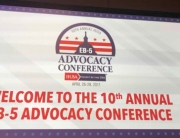This is a reprint of an article co-authored by AAEB5 principal Victor Shum. The original article can be found here.
EB-5 stakeholders must act to protect the integrity of the EB-5 investment market in the wake of the SEC fraud complaint against the International Regional Center Trust of Chicago, LLC.
The EB-5 immigrant investor program provides an important source of capital for investment in job-creating businesses in the United States, but in order to protect the market for these investments, the EB-5 community must demonstrate its commitment to the protection of EB-5 investors from fraudulent operators. The recent action by the Securities and Exchange Commission against the Intercontinental Regional Center Trust of Chicago, LLC, and its operator, Anshoo Sethi, have caused investors to question how many other EB-5 investments are being offered by unscrupulous operators making fraudulent statements in their offering documents and presentations. The best EB-5 regional centers already have established practices that are based on the same standards as are used in U.S. securities offerings and are designed to prevent fraud by project developers using EB-5 financing. Those regional centers who have not already adopted these practices should make this a priority in order to assure EB-5 investors that the EB-5 investment market is based on the same principles of good faith and fair dealing as are the foundation of the U.S. securities markets. We would recommend that every regional center review its due diligence practices with counsel to verify their compliance with best practices.
U.S. securities markets have benefited from laws and regulations requiring issuers and underwriters to use reasonable due diligence to verify the accuracy of statements made in their offering documents, and similar practices should be used by all regional centers for every EB-5 project they promote.
Individual investors in the U.S. securities markets rely on issuers and underwriters of U.S. securities offerings to make accurate statements of fact and reasonable projections of future business. U.S. securities laws put the legal burden on issuers and underwriters to demonstrate that the statements made in securities offering documents are true and not misleading, and if they cannot meet that burden, issuers and underwriters may be held liable for damages caused by any material misrepresentations. These standards of accountability provide investors with assurance that issuers and underwriters will use their best efforts to verify statements of fact and determine the reasonableness of projections used by an issuer in a securities offering. In order to promote the integrity of the EB-5 investment market, we believe that all regional centers should adopt similar practices as are used in U.S. securities markets with respect to the preparation and use of offering documents. Regional centers should advise potential EB-5 investors of the practices they use to protect investors, so that investors can evaluate the strength of the EB-5 projects they invest in using information that has been verified by the regional centers.
Regional centers are the “gatekeepers” to the EB-5 investment market, and they should be responsible for maintaining the integrity of the market.
Regional centers have received the approval of the USCIS to sponsor EB-5 investment offerings, and over 95% of all EB-5 investment offerings are made through regional centers. There are typically no U.S. securities brokers involved in EB-5 offerings, because most EB-5 investments are sold to persons residing outside the U.S. under Securities and Exchange Commission Regulation S through foreign marketing or emigration agents. It is generally not feasible for foreign investors or agents to do their own due diligence investigations on EB-5 investment offerings for a number of reasons, including language differences, geographic distance, and differences in customs and methods of doing business between the United States and countries where EB-5 investors reside. Regional centers, on the other hand, are in a position to assess the truth of statements made by an issuer of EB-5 investments and the reasonable basis for the issuer’s business plan. In the case that the regional center is the issuer and author of such documents, then the regional center bears the burden to offer proof to the market of its statements and projections. Regional centers generally participate in the preparation of offering documents for EB-5 investments, and review business plans of issuers. In addition, no EB-5 investment offering that includes indirect jobs as part of the job creation model can go forward without sponsorship of a regional center. Therefore, regional centers are the appropriate parties to be responsible for assuring that the projects they sponsor are being sold using truthful offering documents and reasonable business plans. Best practice is for the regional center to oversee or author the business plan and offering documents. In the case of overseeing the production of such documents the regional center would be responsible for checking the facts of all statements made in these documents.
Regional centers are not guarantors of EB-5 investments, but they should follow appropriate standards in sponsoring EB-5 investment offerings.
Regional centers are not, and should not, be guarantors of every EB-5 offering they sponsor, because every EB-5 investment must be at risk in order to qualify investors for issuance of EB-5 visas, and because every commercial business by its nature has some risks that are appropriately undertaken by the investors in the business. However, every regional center should have a reasonable basis for determining that the material facts stated in the offering documents for every EB-5 offering they sponsor are true and not misleading, and that if EB-5 investors contribute their capital to a project, that project has a reasonable chance of being completed in accordance with its business plan described in the offering documents.
Regional centers should adopt due diligence practices similar to those used by issuers and underwriters in U.S. securities offerings.
The underwriting standards applied by regional centers for project selection should not be dissimilar to those applied by banks or other funding sources. While every funding source assesses risk differently there are general principles of risk analysis that are applied based on the risk of investment. For example, a private equity investor will typically be willing to accept higher risks than a bank, as consideration for the higher rate of return expected by the private equity investor. EB-5 regional centers may price their funds independent of their place in the capital stack (independent of risk) but the standards of underwriting and evaluation should be similar to the institutional capital they are replacing. If the regional center is replacing bank debt, the due diligence standards used by the regional center should be similar to those used by a bank. If the regional center is replacing private equity, the due diligence standards should be similar to those used by a private equity provider. This is not to say that the cost of the capital should be the same as the capital being replaced, but that the level of due diligence applied by regional centers should be no less than any other financial investor in a project.
Due diligence means verifying factual statements in offering documents and determining that there are no other facts that should be stated so that the offering documents are not misleading.
Verifying factual statements in an offering circular does not mean relying on questionnaires or conversations with project owners, it means asking for and obtaining documented evidence of factual statements, and having experts review projections used to determine project costs and future operating revenues and expenses in light of conditions in the specific industry in which the business will be conducted. The methods for verifying factual statements in an offering circular are generally as follows: (a) to verify that a project developer has experience in the relevant business, ask for details of the background and experience of each of the key managers of the developer, including the names of their employers, dates of their employment, and details of the projects they have been involved with in the same industry as the project; (b) to verify that an issuer has one or more contracts that are material to the business, such as a hotel franchise agreement for a hotel project, ask for executed copies of all material contracts, and talk to the hotel franchisor to verify that the contract is in effect; (c) to verify that an issuer has received or will receive necessary government approvals for project plans, require the issuer to provide copies of the approved plans with evidence of approval from the appropriate governmental authorities; (d) to verify the value of contributed land, ask for copies of recent appraisals, or request your own appraisal from a third party of your selection, and require updated appraisals if they are more than 12 months old or the market conditions have otherwise changed after the original appraisal was done; (e) to verify statements made about market conditions in a specific industry, ask for copies of the data that supports those statements; (f) to verify a project budget and timeline for construction of a project, hire a construction consultant familiar with type of construction being undertaken to review and provide comments on the project budget and timeline; and (g) to verify projections of future revenues and expenses, hire an expert consultant in the industry to review and provide comments on the projections. This is the same process as an underwriter of a U.S. securities offering, or a bank or commercial lender would undertake to conduct its own due diligence on a securities issuer or a borrower of a commercial loan, and which is typically paid for by the developer. Verification will often require engaging an impartial third party expert.
Regional centers should document their due diligence process, the evidence they received to support factual statements and the analysis they used to determine the support for the issuer’s project costs and projections of future revenues and expenses.
In order to be effective, due diligence reviews must be documented in writing. There are various methods of documenting due diligence that could be used. One of those is to create an annotated copy of the private placement memorandum or other offering document, with footnotes that indicate the documents that verify every factual statement. Another method is to create a fact sheet that lists all material facts stated in the offering circular in one column, alongside another column that states the evidence that verified the statement. When an investor or marketing agent asks what due diligence was done to verify the facts stated and business plan presented, the regional center can provide a copy of the due diligence document to show the work it has done to support its due diligence. Proof of facts should be readily available in the regional center’s due diligence files. While most centers will not allow such confidential information to travel or be emailed, the best centers will allow any investor or consultant to visit their offices and review the full due diligence files on any investment.
Regional centers should require the project developer to certify that the offering documents contain no misstatements before the offering documents are distributed.
As part of any due diligence process related to an EB-5 offering, a regional center should require one or more senior officers of the project developer to certify that the EB-5 offering documents contain no material misstatements or omissions. The regional center might ask for other third parties critical to a project to verify certain portions of an offering circular for which those third parties will be responsible. In this way, the regional center can document that it has involved the project developer and other important third parties in the due diligence process, and used reasonable efforts to assure that they have disclosed all material facts in the offering documents.
Regional centers affiliated with EB-5 investment issuers should consider a third party due diligence report.
Since the purpose of due diligence is to demonstrate an independent review of the factual statements in an offering document and an independent analysis of the issuer’s business plan, a regional center that is affiliated with the issuer will not be able to provide an independent review without bringing in a third party. We believe that it is important for the integrity of the EB-5 market that regional centers do bring in third parties to verify the statements made in offering documents the regional centers prepare on their own behalf. The regional center could speed the process by preparing its own due diligence document that provides the supporting documentation and providing those documents to the third party reviewer. The third party reviewer can then certify that it reviewed the materials and documents provided by the regional center and verified the accuracy of the statements made in the offering documents, using the same standards as regional centers which sponsor offerings for third party developers.
A regional center that acts as an administrator of EB-5 regulatory compliance but does not sponsor a specific offering should require the project sponsor to perform the same due diligence that the regional center would otherwise perform.
From time to time, a regional center may agree to act as administrator for an offering in which the regional center is not itself involved as either project sponsor or in marketing the EB-5 offering. In that case, the regional center should require that the project sponsor conduct the same due diligence that the regional center would otherwise perform for a project that it sponsored on its own behalf, and provide a copy of a third party due diligence report that is obtained by the project sponsor.
Regional centers’ due diligence obligations extend through the completion of the offering.
It may take several months to receive subscriptions for an EB-5 offering, during which time it is possible that facts may change. For example, a construction project using EB-5 may be started before all of the EB-5 financing is raised, and changes may occur in the construction budget. In addition, there may be changes in financing status of a project, or other changes that may be deemed material that should be disclosed to investors. Regional centers should regularly communicate with project developers to ask about material changes in the project that may require further disclosure in the offering documents.
Regional centers which implement appropriate due diligence practices will realize multiple benefits.
Regional centers which conduct a thorough due diligence review will identify early in the process the weaknesses of a project. Some of those weaknesses may be corrected with early intervention, before a more serious problem develops that could jeopardize the successful completion of the project. Regional centers which perform and document their due diligence will be considered more reliable by non-U.S. investors and marketing agents, which could translate in greater market acceptance for their offerings than other regional centers which do not demonstrate adequate due diligence practices. A regional center which prepares strong documentation of its due diligence investigation will also have evidence available in the event something does go wrong with a project that was not related to misrepresentations in the offering documents, which the regional center can use to defend itself in the event of any claims brought by investors or other third parties related to the project. Most importantly, adoption of due diligence standards by regional centers will strengthen the integrity of the entire EB-5 market, which is necessary to assure that this market remains an important financing source for U.S. job-creating businesses.
We believe that all regional centers can and should follow the due diligence best practices outlined above, for the protection of all participants in the EB-5 market.





Leave A Comment
You must be logged in to post a comment.